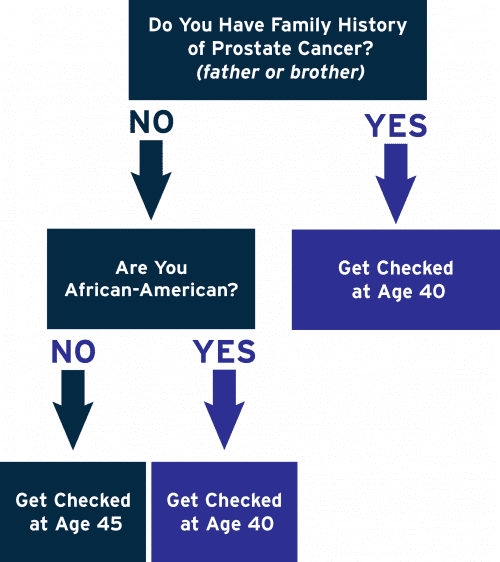When to get Checked
About Prostate Cancer
Prevention, and When You Should Get Checked
The ultimate goal is to prevent men from developing prostate cancer. Although significant progress has been made and genetic and environmental risk factors for prostate cancer have been identified, the evidence is not strong enough for conclusive recommendations.
That being said, there is a point in your life where you should get your PSA (Prostate-Specific Antigen) level checked. We recommend age 45, unless you are African-American or have a history of prostate cancer in your family. In this case, you should be checked starting at age 40. (see chart at bottom of page)
What is PSA?
Prostate-Specific Antigen is a substance produced by the prostate that may be found in an increased amount in the blood of men who have prostate cancer, benign prostatic hyperplasia, or infection or inflammation of the prostate.
The normal range is between 0 and 4 ng/ml. An abnormal rise: A PSA score may also be considered abnormal if it rises a certain amount in a single year. For example, if your score rises more than 0.35 ng/ml in a single year, your doctor may recommend further testing.1
Studies with Finasteride and dutasteride, which are typically used to treat men with the noncancerous condition BPH, have shown that these drugs may reduce the chances that a man will be diagnosed with prostate cancer. The Prostate Cancer Prevention Trial was one of the largest prostate cancer trials ever and involved more than 18,000 men followed for over a decade. This study showed that Finasteride therapy reduced the risk that a man would be diagnosed with prostate cancer by 25%. The study did find a slightly higher rate of aggressive prostate cancers in men who took Finasteride, which other studies have suggested may be due to artifact or greater ability to find more aggressive cancers due to a smaller gland size (ie a biopsy needle can more easily hit a cancer in a smaller gland than a larger gland). Given that this agent is well tolerated, current recommendations call for a discussion about the risks and benefits of these agents in the prevention of prostate cancer, for treatment of other conditions, such as BPH.
Diet and lifestyle modifications have also been shown to reduce the risk of prostate cancer development and progression, and can help men with prostate cancer live longer and better lives.
1Source: John Hopkins Medicine
A Quick Guide to When You Should Get Your PSA Checked...


